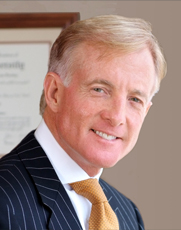By Janet Elliott and Mark Curriden
The hourly bill rate of $1,000 is one of those nice round numbers that make a few lawyers puff up with pride, others duck their heads and some scratch theirs.
Five years after the elusive $1,000-an-hour barrier was breached by a group of New York firms and a couple lawyers in Houston and Dallas, the four-figure mark remains an exclusive club in Texas.
But that is likely to change during the next year or so.
Lawyers, clients and law firm consultants say that there are scores of partners at major corporate law firms in Dallas and Houston who raised their billable rate above $900 an hour during the past year. And sizeable percentage of those lawyers charge clients $950 or $975 an hour.

While high-profile trial lawyers, including Steve Susman of Houston and Bill Brewer of Dallas, were founding members of the $1,000-an-hour club, the new group applying for membership represents large corporations in corporate securities, mergers and acquisitions, bankruptcy and tax law. They are partners at mega-law firms, such as Latham & Watkins, Skadden Arps, Weil, Gotshal & Manges and Vinson & Elkins.
“These new hourly rates are extraordinary – astounding,” says the general counsel of a large private equity firm, who asked not to be identified. “It seems like everyone is now a $950 an hour lawyer, and some are $980 or $990.
“There’s no difference in the rates of Texas and New York firms any more,” he says.
Another general counsel of a Fortune 50 company based in Texas said that rates of top Texas law firms have gotten out of control. He said his corporate legal department refuses to hire lawyers at such high rates. And he predicts that the ever-increasing billable hour rate will lead to more alternative fee arrangements.
The lawyers who charge those rates are not worried.
“One thousand dollars an hour is not what it used to be for us,” says Brewer, who charges $1,250 hourly. The co-founder of Dallas-based Bickel & Brewer, a mid-size firm with a growing New York office, says his partner John Bickel is at $1,050 and others at the firm are in the $900 range.
Legal consultants and headhunters say the growth in the energy sector and entrance of mega-global law firms into the Texas market have pushed rates higher.
“Texas is red hot compared to legal markets elsewhere,” says Ward Bower, who advises law firms on compensation-related issues for Altman Weil. “Those sitting at the top of their profession are finding times are very favorable.”
Bower cautions that the quoted rates can be similar to the sticker price on a new car – subject to healthy bargaining. He thinks many lawyers bump up against a threshold of about $700 an hour.
Brewer’s astounding fee is, in part, an effort by his firm to negotiate alternate fee arrangements with clients. Such arrangements can offer lower hourly rates, but include incentives for attorneys to have an economic stake in the client’s objectives.
“The process just gets distorted when virtually all the work is based on the hours your lawyers spend, not the outcome you achieve,” says Brewer, who is defending 3M in an environmental lawsuit brought by Minnesota and representing the owner of the former Waikiki Edition hotel in a dispute with Marriott.
Brewer also has represented FLIR Systems, a defense contractor specializing in thermal imaging, in a trade secrets dispute with another contractor. William “Wit” Davis, the company’s senior vice president and general counsel, says Brewer’s time is not a major slice of the total bill in complex litigation because much of the work is done by lawyers down the ladder.
“That big number is impressive but I pay a lot more attention to what the rate scale is up and down the ladder,” says Davis. He also is open to alternate fee arrangements, which he says can be easier to structure when his company is a plaintiff in a lawsuit because of the potential award that can be divvied up between the client and outside counsel.

Despite the efforts of firms to push for creative fee deals, companies have been hesitant to deviate from conventional hourly billing. This is partly because it allows them to estimate costs for a particular matter, says Michael Dillard, managing partner of the Houston office of New York mega-firm Latham & Watkins.
Dillard, who routinely is involved in multibillion-dollar transactions, would not disclose his billing rate.
“Our billable hourly rate, at the end of the day, is not the driving force. It’s the overall value we’re delivering to clients,” he says.
“These are lawyers who get a lot of repeat business and a lot of referrals. They are not competing on the cheapest billable hour and making it up on volume,” Dillard says. “The overall bill is pretty much irrelevant at the end of the day compared to client expectations.”
Rates Go National
Skadden is another top New York firm with operations in Texas. Charles Schwartz, who heads the litigation practice in Houston, burst into laughter when asked if he is in the $1,000-an-hour club.
“I don’t want this call,” he says. “My billing rate is commensurate with my experience and responsibilities in matters.”
Schwartz says Skadden has a unified billing structure that pays lawyers based on their “experience and vintage” instead of what city they park their briefcases. He also wouldn’t disclose his fees but said they are “commensurate with national billing rates charged by premier law firms.”
Schwartz represents clients such as XTO Energy at critical junctures such as when shareholders were trying to stop Exxon Mobil’s $41 billion acquisition of XTO.
There are times when a key piece of advice or case-winning motion can mean hundreds of millions of dollars to his clients, which he says makes him feel grossly underpaid at his hourly rate. Other times the inefficiency of the litigation process – scheduling depositions, for example – makes his rates seem many times higher than the value of the services.
“Sometimes when you do something that turns out right, your hourly rate doesn’t really cover the value. For routine matters, I wish there was a better way to compensate,” Schwartz says.
Dallas legal lion Tom Melsheimer, whose clients include Dallas Mavericks owner Mark Cuban, says he thinks there is still sticker shock in Texas when hourly rates top $1,000. His firm, Fish & Richardson, sets his rate at $995.
At that price, he says he can’t be the lawyer who does 75 percent of the work on a case. Instead, he is the one who is arguing the motion for summary judgment or telling a client it’s time to settle.
“I get to do the fun stuff,” says Melsheimer.
High rates seem proportionate when they are paid in connection with litigation where huge sums are at stake. They also encourage other arrangements, such as his contingency fee deal with a whistleblower he recently represented as co-counsel with the Texas Attorney General’s Office in a false marketing Medicaid fraud case against Johnson & Johnson. That case settled for $158 million after two weeks of trial in Travis County.
Johnson & Johnson’s legal team included top courtroom talent from Austin, Dallas and New York. Companies sued in Texas are more likely now to bring in lawyers from out-of-state, another factor driving up prices.
Psychological Barrier
For every lawyer in the financial stratosphere, there are dozens bobbing up and down against the invisible ceiling. Fear of sticker shock – particularly for their Texas clients – keeps the rates in the $900s.
“I remember when we used to do that with the 90s to keep from going over 100,” says Jan Soifer of Austin’s O’Connell Soifer, referring to the mid-1980s when lawyers were chomping at the bit to bill a Ben Franklin per hour.
When Simpson Thacher & Bartlett moved into Houston in 2011, many thought the firm would import its top billing rates. But partner Robert Rabalais said that no one in the Houston office bills at $1,000, although the rates are not consciously being held below that level.
Other firms mentioned with lawyers at or near the billing stratosphere include homegrown giants Akin Gump, Baker Botts and Vinson & Elkins, along with national firms that have moved into Texas, such as Gibson Dunn, Jones Day and Morgan Lewis.
One area where the murky world of hourly rates gets some sunlight is bankruptcy court. In the American Airlines bankruptcy, legal fees for Weil, Gotshal & Manges, which is leading the Chapter 11 proceedings, range from $400 an hour for some associates to $1,000 an hour for the senior partners, a couple of which are based in the firm’s Dallas office.
Ray Guy, a top business litigator in Weil’s Houston office, declined to comment on the firm’s Texas rates.
Rates that top $1,000 an hour are being scrutinized for the first time in 15 years as part of a review of the Chapter 11 billing guidelines. The website Law360.com reported that more than 100 law firms signed a letter saying the rates have brought more talented lawyers into the field, which has in turn protected jobs by allowing companies to reorganize instead of dissolve.
Susman, co-founder of powerhouse firm Susman Godfrey in Houston, pole-vaulted over $1,000 way back in 2003. He remains the only partner who bills at $1,000 or more, says managing partner Neil Manne.
Susman was vacationing in Antarctica, but told the Houston Chronicle in 2007 that his clients don’t complain because his decades of experience in handling lawsuits make him worth the price.
“Most of the time, it is a decision that something is unnecessary. That decision saves the client thousands of dollars in hours that would normally be charged by a younger lawyer who runs down every rabbit trail and turns over every rock,” he said. “Second, I can do things in one-fourth the time that lawyers charging $250 per hour can do them.”
Not Justified
David Chamberlain, a litigator who conducts fee reviews and offers expert testimony about attorney fees, says most litigation tops out at $350 an hour. He often finds inefficiencies in the number of hours billed, such as when a firm charges half a million for taking 18 months to prepare a successful motion to dismiss a case, work that he contends could have been done in one-third the time.
“I can’t see anybody paying anybody $1,000 an hour to handle a case,” says Chamberlain, a partner in Austin’s Chamberlain McHaney. “I don’t think that kind of money is ever justified.”
PLEASE NOTE: Content of The Texas Lawbook is controlled and protected by specific licensing agreements with our subscribers and under federal copyright laws. Any distribution of this content without the consent of The Texas Lawbook is prohibited.

Leave a Reply
You must be logged in to post a comment.